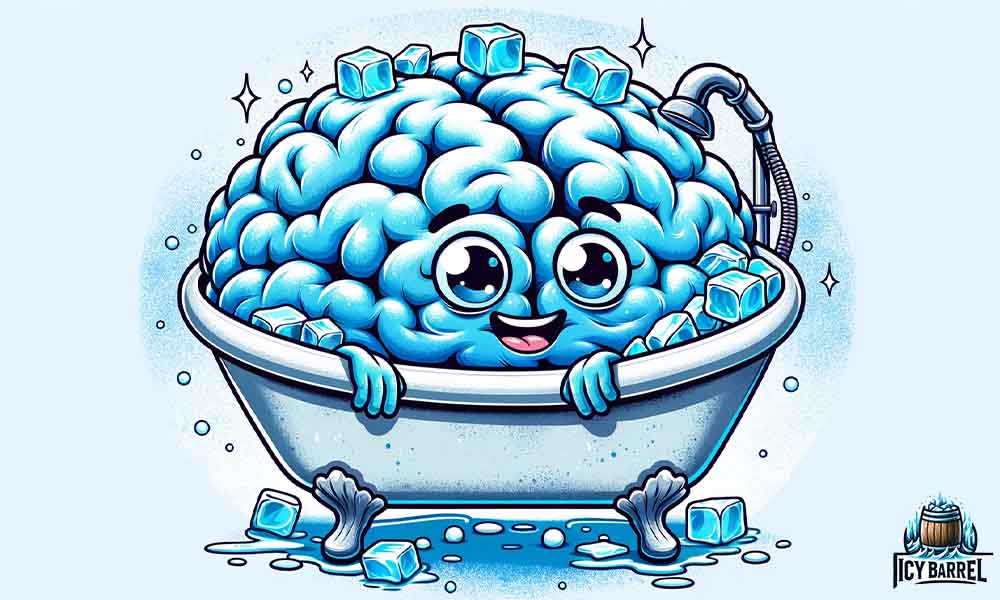If you’re looking for a way to improve your mental health, you might want to consider taking an ice bath. While the idea of immersing yourself in ice-cold water might seem daunting, there are many benefits to this practice that can positively impact your mental wellbeing. In this article, we’ll explore the potential benefits of ice baths for mental health and how they work.
Ice baths have been used for centuries as a way to promote physical healing and reduce inflammation. However, recent research has shown that they can also have a positive impact on mental health. This is because the sudden change in temperature that occurs when you immerse yourself in cold water triggers the release of endorphins, which are the body’s natural mood-boosters. Additionally, the shock to your system can help reduce stress and anxiety, leaving you feeling calmer and more relaxed.
In addition to these cold exposure benefits, ice baths have also been shown to improve sleep quality, increase alertness and focus, and boost overall energy levels. While more research is needed to fully understand the extent of these benefits, there’s no denying that ice baths can be a powerful tool for improving mental health. So if you’re looking for a natural way to reduce stress and anxiety and boost your mood, you might want to give ice baths a try.
Mental Health Benefits of Ice Baths
Taking a plunge into an ice bath may seem like a daunting task, but it can have numerous benefits for your mental health. Here are some of the ways that cold water immersion can improve your mental wellbeing.
Helps Depression and Anxiety
If you suffer from depression or anxiety, regular ice baths may help alleviate symptoms. The cold water can stimulate the release of endorphins and dopamine, which can improve your mood and reduce feelings of anxiety.
Improve Your Mood and Reduce Stress
Ice baths can also help reduce stress levels. By immersing yourself in cold water, you activate your body’s stress response, which can help you better manage stress in your daily life. Additionally, the release of endorphins and dopamine can improve your mood and help you feel more relaxed.
Improve General Brain Function

Cold water immersion can also improve your cognitive performance. Ice baths can improve mental clarity and focus by releasing norepinephrine, a neurotransmitter that plays a critical role in attention and alertness.
Enhanced Mental Resilience
Taking regular ice baths can also increase your stress resilience and help you develop greater mental toughness. By exposing yourself to cold water, you can train your body to better handle stress and adversity.
Improved PTSD Symptoms
Finally, ice baths may be particularly helpful for those suffering from PTSD. Cold water immersion can help regulate hormone imbalances and activate the vagus nerve, which can improve immunity and reduce symptoms of PTSD.
Safety and Precautions
Ice baths can be a safe and effective way to improve mental health and physical well-being. However, it is important to take certain precautions to ensure your safety and avoid potential risks of cold exposure.
Before taking an ice bath, it is recommended to consult with your doctor, especially if you have any medical conditions such as heart disease, high blood pressure, or diabetes. If you have poor circulation or Raynaud’s syndrome, you should also be cautious as these conditions can increase your risk of cold-related injuries.
 To avoid hypothermia, it is important to monitor your body temperature with a thermometer and limit your time in the ice bath. You can start with short sessions of one to two minutes and gradually increase the duration as your body gets used to the cold. It is also important to keep your head above water and avoid submerging your face.
To avoid hypothermia, it is important to monitor your body temperature with a thermometer and limit your time in the ice bath. You can start with short sessions of one to two minutes and gradually increase the duration as your body gets used to the cold. It is also important to keep your head above water and avoid submerging your face.
To prevent the cold shock response, which can cause a sudden increase in heart rate and blood pressure, it is recommended to enter the ice bath slowly and gradually. You can start by dipping your feet or hands in the water and then slowly submerge your body.
It is important to avoid taking an ice bath if you have any open wounds or injuries, as the cold water can slow down the healing process and increase the risk of infection. It is also recommended to dry off and warm up with a towel and warm clothes after the ice bath to prevent heat loss and hypothermia.
Ideal Ice Bath Temp and Time For Mental Benefits
The practice of using ice baths for mental health has specific considerations regarding temperatures and duration. When it comes to ice bath temperatures, the general recommendation falls between 50 to 59 degrees Fahrenheit. This range is not only supported by research but is also effective for cold water immersion therapy.
Specifically, for mental relaxation and stress reduction, temperatures are typically set slightly higher, within the 55-59 degrees Fahrenheit bracket. This ensures comfort while still providing the therapeutic benefits of cold immersion.

As for the ideal ice bath duration, it varies, but the consensus is to keep it under 15 minutes. Short ice baths, lasting between 1 to 5 minutes, can suffice for experiencing benefits, with some experts suggesting around 10 minutes. When focusing on mental health benefits, a duration of 10 to 20 minutes is generally recommended.
However, it’s crucial to understand that longer durations don’t always equate to more benefits and can pose risks of cold-related injuries. It’s advised to be attentive to one’s own body and adjust the ice bath duration as needed.
Concluding Thoughts
In conclusion, ice baths have been found to provide numerous benefits for mental health. From reducing stress and anxiety to improving mood and promoting relaxation, ice baths can be a powerful tool for improving your overall well-being.
One popular method of ice bath therapy is the Wim Hof Method, which involves a combination of breathing exercises and cold exposure. Many celebrities have embraced this method, including Tom Brady and Tony Robbins, who have both spoken about the benefits of ice baths for mental health.
A systematic review of the scientific literature has found that ice baths can be effective for reducing migraine symptoms and may also have potential benefits for those with depression. Additionally, cold-water swimmers have reported improved mental clarity and resilience after taking regular dips in cold water.
While cryotherapy and other cold-based therapies are becoming more popular, ice baths remain a simple and accessible option for those looking to improve their mental health. Whether you’re dealing with stress, anxiety, or simply looking for a way to relax and unwind, an ice bath may be just what you need to feel your best.
Overall, the benefits of ice baths for mental health are clear, and with proper guidance and precautions, anyone can safely incorporate this practice into their self-care routine.




